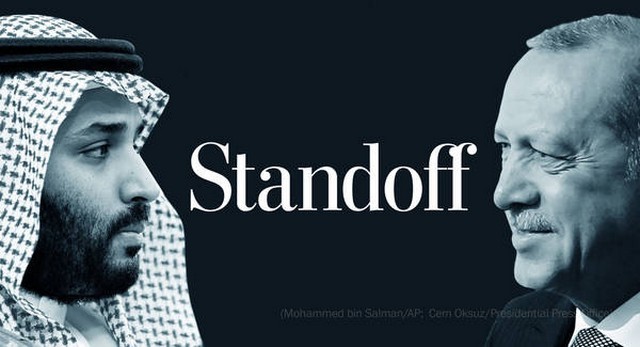By Ishaan Tharoor
We still do not know what has happened to Jamal Khashoggi. The Saudi journalist, who has contributed numerous articles to The Washington Post’s Global Opinions section, has not been seen since he entered the Saudi consulate in Istanbul on Tuesday afternoon to finalize papers regarding a divorce. Khashoggi is a prominent commentator, familiar to a generation of Middle East correspondents seeking insight into the intrigues of Riyadh. In recent years, he had turned into a critic of the kingdom’s leadership and relocated to Washington in a kind of self-imposed exile.
Turkish authorities insist that Khashoggi, 59, is being held in the consulate, as do his friends. “We have talked with some Turkish authorities and the police,” Turan Kislakci, an associate of Khashoggi, told my colleagues. “I think 100 percent that he is inside.”
But Saudi officials deny they have detained the journalist, claiming in an emailed statement to my colleagues that Khashoggi is not in the building.
“We were going to marry this week,” said Khashoggi’s fiancee, who spoke on the condition of anonymity, to my colleagues in Istanbul on Wednesday. She added that her spouse-to-be had been concerned about going to the consulate. “Of course he was worried. How comfortable can one be if he is not liked by his country?”
“We have been unable to reach Jamal today and are very concerned about where he may be,” said The Post’s international opinions editor, Eli Lopez, in a statement Thursday. “We are monitoring the situation closely, trying to gather more information. It would be unfair and outrageous if he has been detained for his work as a journalist and commentator.”
In Washington, analysts and former diplomats who are generally supportive of Saudi Arabia expressed their disquiet. “The only logical explanations are that the Saudi government is either keeping him in the consulate building or has kidnapped him and taken him to Saudi Arabia,” wrote Elliott Abrams, a former official in the George W. Bush administration. He warned that “the reputation of the current Saudi government will be harmed irreparably.”
Such detentions have become more conspicuous under the kingdom’s young crown prince, Mohammed bin Salman. Since taking de facto power in a shake-up last year, Mohammed has detained feminist activists and billionaire magnates alike. Saudi authorities even briefly held the sitting Lebanese prime minister in a Riyadh hotel last year. All of this came as Mohammed promised to open up Saudi Arabia’s conservative society and wean itself off of oil dependence.
Post columnist Jason Rezaian, a journalist who spent many months in unjust Iranian detention, puzzled over the nature of Mohammed bin Salman’s reforms. “Troubling developments from the community of activists inside the country, however, tell a vastly different story. Those pushing for change — whether they are women’s rights activists, journalists or ethnic minorities — report being systematically harassed by the authorities,” Rezaian wrote. “With every supposed reform comes a wave of fresh arrests, prison sentences and increasingly repressive behavior.”
The crown prince, Rezaian noted, is a frequent target of Khashoggi’s columns. “At each turning point . . . Jamal has offered readers of The Post insightful commentary and sharp criticism about the seemingly impenetrable country,” he wrote.
The geopolitical backdrop to Khashoggi’s disappearance is worth considering. Turkish President Recep Tayyip Erdogan has presided over a sweeping purge of the country’s civil society and government ever since a botched coup attempt in 2016. Yet Turkey has also become something of a sanctuary for Arab dissidents of various stripes.
In 2013, after a military coup unseated Egyptian President Mohamed Morsi and brutally crushed his Muslim Brotherhood, a host of Egyptian dissidents and Islamist politicians took up residence in Istanbul. Erdogan remains a staunch critic of Egyptian President Abdel Fattah al-Sissi, the former army officer who ousted Morsi.
Sissi has counted on the support of Saudi Arabia and the United Arab Emirates, two Gulf monarchies that have actively worked against Islamist political parties across the Arab world. In a column for The Post, Khashoggi rebuked the “intolerant hatred” shown by the Saudis and Emiratis “for any form of political Islam.” He argued “there can be no political reform and democracy in any Arab country without accepting that political Islam is a part of it.”
That’s a position welcomed by Erdogan, who once hoped his brand of religiously tinged democratic politics would be embraced by the Arab world. Instead, his rule has grown more autocratic, and the Middle East has been consumed by a series of wars and bitter geopolitical disputes. That includes the standoff between the Saudis, Emiratis and their allies on one side and Qatar on the other.
Turkey flew troops and food supplies into Qatar last year and still maintains a military base in Doha. Meanwhile, the Qataris pledged to inject some $15 billion worth of investment in Turkey’s flagging economy in August. Some analysts read Ankara’s moves — coupled with Erdogan’s overtures to Iran over the past year — as a riposte to the emergence of a U.S.-backed Middle East bloc including the Saudis, Emiratis and even Israel.
Amid the chaos of the region’s politics, Khashoggi urged the kingdom conduct itself with “ethics” and “dignity” — and therefore called on Saudi Arabia to draw down its war in Yemen.
Khashoggi also wrote about the pain of seeing friends arrested or otherwise forced into silence. “I have left my home, my family and my job, and I am raising my voice,” he wrote in his first column for The Post, where he openly worried about facing arrest if he returned. “To do otherwise would betray those who languish in prison. I can speak when so many cannot. I want you to know that Saudi Arabia has not always been as it is now. We Saudis deserve better.”
Ishaan Tharoor writes about foreign affairs for The Washington Post.
5 October 2018
Source: https://s2.washingtonpost.com/camp-rw/?e=a2hhbG1hcnhAeWFob28uY29t&s=5bb6efd6fe1ff67504b79d17

